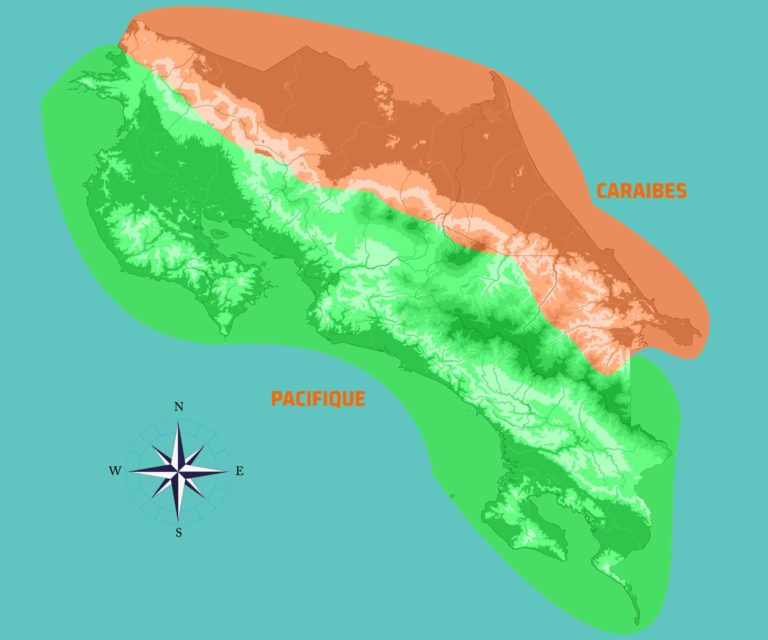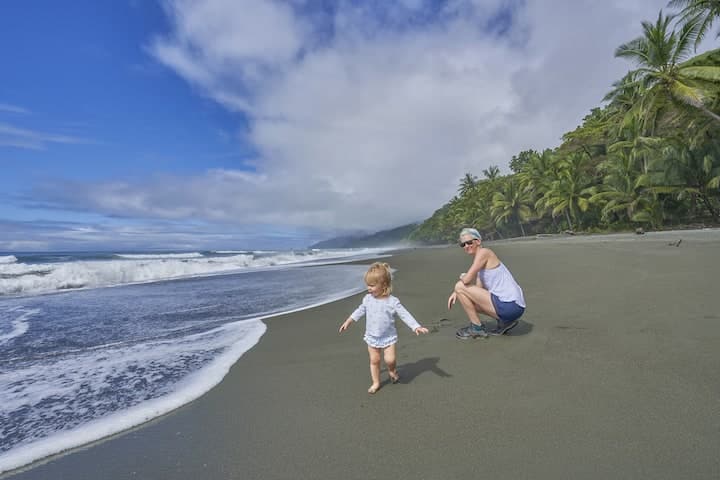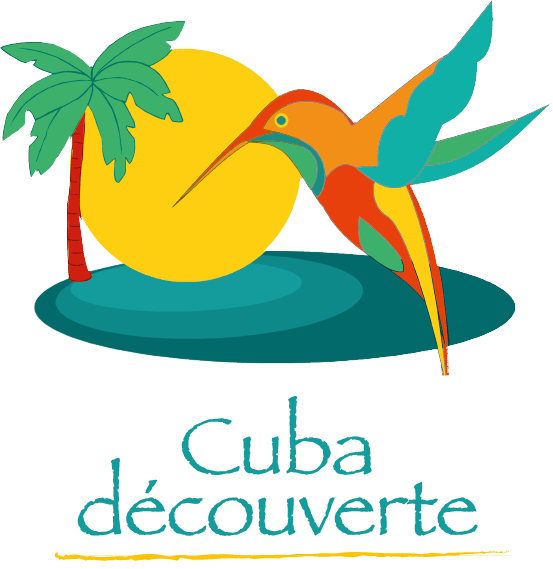Costa Rica has become the world reference for ecotourism, solidarity tourism, rural tourism and environmental preservation for more than fifteen years. These are all terms to describe a commitment to harmony with nature and indigenous populations. With nearly 25% of its surface area protected in national parks and nature reserves, its preserved wildlife (6% of the world’s biodiversity is concentrated in the territory), exuberant tropical nature, and a lasting democracy, the country benefits from a positive image compared to its Central American neighbors. This sympathy factor has attracted not only tourists, but also many scientists from around the world who have come to observe and understand this biodiversity.
From San José, the capital, through Arenal and to the far reaches of the country, nature and the environment are a priority.
A political choice
Since the mid-19th century, political discourse has been tinged with ecology and a desire to protect environmental resources. Since then, this national awareness has continued to grow. In 1948, the Organization for Tropical Studies (OTS) was founded, followed by the Tropical Scientific Center (CCT) in 1963. That same year, the country’s first biological reserve — Cabo Blanco — was created.
The Forest Law of 1969, strengthened in 1989, established the network of national parks, protective zones, wildlife refuges, and biological reserves managed by the National System for the Management of Conservation Areas of Costa Rica (SINAC). The country now has 21 national parks and protected areas.
A pioneer in this field, Costa Rica has become THE ecotourism destination in just a few years.
A few tasks darken the picture
Behind this image, however, lie some gray areas. This is the case in northern Guanacaste, where large hotel chains have built their buildings along the Pacific coast, despite basic rules. Wastewater treatment, for example, or the preservation of sensitive areas such as mangroves, has often been a sensitive subject in this region. It is also where the country’s biggest real estate scandals have taken place. This is a far cry from ecotourism!
That’s why, in keeping with our ethical travel philosophy, we do not offer these types of hotels on our Costa Rica tours. Our stays offer you an unforgettable experience, a rendezvous with tropical nature and Central American culture.
After such a journey into the living world, your behavior will change in the face of challenges for the conservation of the planet. It is up to each of us to become an ambassador for the defense of the environment!
Greenwashing and the pitfalls
Many service providers are riding the wave of sustainable tourism, rural tourism, or ecotourism, particularly in Costa Rica, but fail to comply with essential rules. This is called greenwashing.
Providing a positive image without being invested or responsible in order to appear honest is a common practice.
The important points to check to avoid being “ripped off” are to verify that the service provider is in good standing with local authorities.
The first point to check or request is the presentation of a PATENTE (license to practice) issued by the municipalities. This implies first having a Permiso de Salud (Health Permit), which authorizes the company to operate according to established criteria.
The second point is registration with the ICT – Costa Rican Tourism Institute, a prerequisite. Many agencies are not registered and do not declare their income or employees.
Again, many do not meet the requirements.
Also beware of companies that are members of only certain organizations, such as the Franco-Costa Rican Chamber, which does not guarantee that it has passed the first two stages, but unscrupulous companies use this registration as a means of showing off.
Here again, many local travel agencies do not follow the rules.
The CST: this label is awarded to companies that MUST MEET THE FIRST TWO POINTS. But it goes further by requiring all the criteria of a strict set of specifications on themes as varied as: environmental protection, staff training, concrete actions encouraging tourists to participate in sustainable policies during their trip, the company’s interactions with local communities, waste reduction, the involvement of company staff, etc. In short, obtaining the CST is a guarantee of good conduct, respect for the population and authorities, and a guarantee against greenwashing.
Here are the key points in brief to ensure you choose the right company.
Our commitments
Costa Rica Discovery is proud to be a Platinum Member of the Corcovado Foundation as part of their Osa Peninsula Conservation Program.
The Corcovado Foundation’s ecotourism missions are to increase wildlife protection, promote environmental education, sustainable tourism, and community participation through the use of natural resources in Costa Rica’s South Pacific region. The Corcovado Foundation’s programs focus on four main areas of work in the Osa Peninsula: sea turtle conservation, youth education, sustainable tourism, and community development.
Sea Turtle Conservation
Since 2006, the Corcovado Foundation has been committed to ecotourism by protecting turtle eggs from poaching and natural predation. It provides sustainable economic opportunities for local people through ecotourism and volunteerism, and raises community awareness about the importance of conserving natural resources.
Environmental education
This program was initiated in 2003. It provides environmental lessons and programs in local schools, creates sharing through clubs while offering a range of sustainability-related activities, organizes cultural events and works with the community to improve public facilities.
Sustainable tourism
The Foundation’s goal, through a program supported by more than 10 local businesses, was to train more than 400 people in sustainable tourism and ecotourism practices and to plant more than 120 native trees for the purpose of carbon offsetting. The Foundation also created a non-profit youth hostel that generated more than $17,000 to help fund other environmental programs. It also educated tour operators on sustainable methods, supported the local economy and promoted nature-friendly business practices.
Community development
The Osa Rural Tours network and other sustainable community development initiatives aim to reduce poverty in the Osa Peninsula while protecting local ecosystems.
The Corcovado Foundation offers:
- support for the creation of micro-tourism businesses that encourage the protection of the rainforest.
- regular training for local communities in areas such as project management, marketing, accounting and English.
- improving essential services such as waste collection and recycling.
The Bandera Azul – Blue Flag – program is a label awarded annually that recognizes effort and voluntary work in the pursuit of conservation and development in accordance with the protection of natural resources, the implementation of actions to address climate change, the search for better sanitary conditions and the improvement of public health for the population of Costa Rica.
“Ecotourism is a form of responsible travel in natural areas that contributes to the protection of the environment and the well-being of local populations.”
Costa Rica Découverte, a vision of travel in harmony with nature
Ecotourism in Costa Rica is a model of sustainable tourism that attracts an international clientele, aware of the importance of preserving the environment while enjoying a rewarding vacation. Costa Rica, recognized for its exceptional biodiversity and its conservation efforts, offers a unique experience to responsible travelers. Costa Rica Découverte has been involved in responsible tourism for over 15 years. We strive to offer responsible and ethical tours. We are committed locally to associations that work hard to save turtles, help cultural minorities, and offer a better future to disadvantaged populations.
We provide our clients with codes of good conduct for responsible tourism. If you choose a tour with Costa Rica Découverte, you can be sure that you’re participating in a national effort to protect the environment. Costa Rica protects its nature, creates parks, and educates its population; it’s only natural that travelers respect and support all of these efforts. For this reason, we never recommend hotels like large chains like Riu, Hilton, or Barcelo. There are numerous examples of their bad practices in Costa Rica, and scandals abound. Tourism development must serve the country, not harm it.
In our tours, we prefer to support organizations whose revenues will benefit local communities and Costa Rica. Small eco-lodges can be found throughout Costa Rica, from north to south and east to west. It’s important to support and work with them to enable the country to continue protecting its parks and reserves.
These hotel chains rarely pay taxes in the country and have little respect for local laws.
Being a responsible traveler
According to the code of responsible tourists and travelers approved by the International Committee for Ethical Tourism (May 2005)
Open your mind to other cultures and traditions:
- Be tolerant and respect cultural diversity.
- Learn about your destination, its customs, rules, and traditions.
- Respect human rights. Any form of exploitation (child labor, sexual exploitation, etc.) goes against the fundamental objectives of responsible tourism.
Some examples specific to Costa Rica:
- Wearing a topless top on the beach. Costa Rica is not France. Respect them.
- Don’t climb a volcano if it’s prohibited.
- Check the source of the information, as the internet is full of false good ideas.
Protect the environment:
- Dispose of your trash in trash cans and use the recycling systems provided.
- Follow the regulations in force in reserves or natural parks.
- Respect your guide and anyone accompanying you during your tour.
- Pay entrance or tourist fees, which support the conservation and preservation of parks and reserves.
Do not buy products made with endangered plants or animals.
Costa Rica preserves its nature
One of the reasons Costa Rica is often cited as an example of environmental protection is its commitment to renewable energy. More than 99% of its electricity is generated from renewable sources, primarily hydroelectricity, wind power, and geothermal energy. This transition to clean energy sources has significantly reduced the country’s greenhouse gas emissions.
Costa Rica is also renowned for its extensive network of national parks and nature reserves. Approximately 25% of its territory is protected, providing a vital refuge for a multitude of animal and plant species. Iconic destinations like Corcovado National Park and Tortuguero National Park attract nature lovers from around the world with their rich and diverse flora and fauna.
Eco-tourism also plays a vital role in Costa Rica’s natural preservation. The country has developed a sustainable tourism industry that encourages visitors to appreciate the country’s natural beauty while respecting its fragile environment. Numerous initiatives, such as eco-lodges and responsible adventure tours, offer travelers the opportunity to experience nature while contributing to its preservation.
Additionally, the Costa Rican government has implemented ambitious measures to combat deforestation and promote reforestation. Payment for Environmental Services programs incentivize landowners to conserve their forests and restore degraded ecosystems, thereby contributing to the preservation of natural habitats and the fight against climate change.
In short, Costa Rica stands out as a world leader in nature conservation thanks to its commitment to renewable energy, its extensive network of national parks, its eco-tourism, and its conservation policies. This small country demonstrates that it is possible to reconcile economic development and environmental protection, offering an inspiring example for the rest of the world.
Contribute to economic and social development:
- Support the local economy by buying local products.
- Haggling shouldn’t stand in the way of fair compensation.
Find out about the health situation in the country:
- Costa Rica’s health status is quite good. No specific vaccinations are required to enter the country.
Find out about the country’s legislation:
- Trafficking in illegal drugs, weapons, antiques, protected species, and dangerous or prohibited products or substances is punishable by law.
- Comply with the Highway Code.
Respect cultural resources:
- Where possible, choose activities that protect artistic, archaeological and cultural heritage.
Being a responsible agency
According to the working principles issued by ATR (Acting for Responsible Tourism)
Involve and consider local populations:
- By favoring local suppliers.
- By working with competent, committed, trained service providers who share the same values and working principles.
- By supporting local development efforts.
- By informing and raising awareness among travelers and our staff about respecting the cultures of local populations.
We particularly support Aventuras Naturales Yorkin, an indigenous community in the Caribbean.
Minimize the impact of our activity on the environment:
- By implementing a waste management policy and using ecological cleaning products.
- By favoring suppliers who pursue an environmental protection policy.
- By raising awareness among travelers and our staff about respecting the environment.
- By participating in reforestation.
Respect our customers:
- By pursuing a responsible communications policy.
- By relying on trained and motivated staff.
- By providing advice that meets our clients’ expectations.
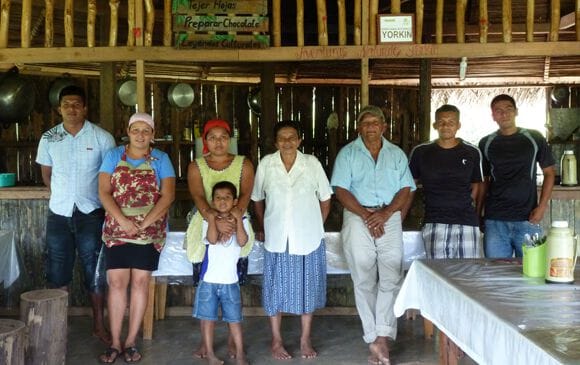
In short, Costa Rica and ecotourism have a long-standing love story. A love focused on nature, humanity, and a healthy, modern future. The country is modernizing without abandoning its basic principles. Initiatives are encouraged, and young Costa Ricans are being educated about reasonable and responsible consumption practices from a young age.
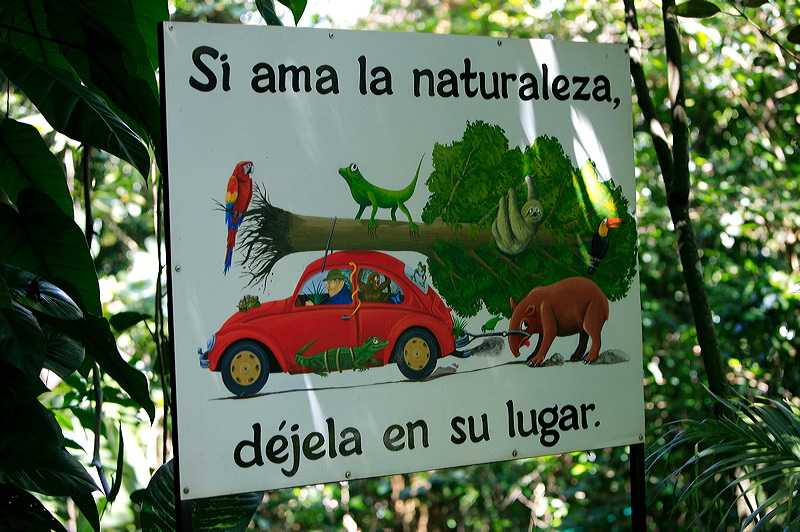
A recent look at Costa Rica
Why travel with us?

A flawless reputation since 2008

A single contact in English

Our presence on the ground all year round

Our expertise for a tailor-made offer

